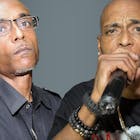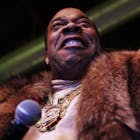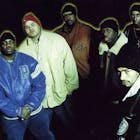
Fat Joe: "Forrest Gump" of This Rap Sh*t?
Fat Joe: "They Say I'm Forrest Gump of This Rap Sh*t..."
Published Mon, September 28, 2020 at 7:12 AM EDT
published Sept. 28, 2020
"They say I'm the Forrest Gump of this rap shit," Fat Joe says with a chuckle.
On his 1995 track, "Fat Joe's In Town", Fat Joe made one request, "whatever you do, keep this Hip-Hop shit true." For close to 30 years, Fat Joe has made it his mission to ensure this request is not an empty one. Along the way, he helped push Hip-Hop music and culture from the projects and parks of the Bronx to a global stage.
It's mid-day on September 3rd, just a few days before Labor Day and the closing chapter of what's been the cruelest of summers.
It's a comical comparison: Fat Joe and Forrest Gump. Admittedly, I took it at surface level when Joe said it at the start of our 45-minute Zoom conversation. But in the days since, the phrase has circled around in my brain, the way a for-sure layup might circle the rim before expectedly going through the hoop.
I was 12 years old when Forrest Gump was released in the summer of 1994, my mom took me to see it at the Hyde Park Theater, on Chicago's Southside. The day is locked in my memory because after the film, it started pouring, forcing us to seek cover under the 53rd Street viaduct on our walk home. My understanding of film and special effects was still growing, and I was fascinated by how the filmmakers were able to superimpose Forrest Gump (played by Tom Hanks) into scenes with John F. Kennedy, John Lennon, and Richard Nixon. This later became known as the "Gump Effect" in filmmaking. Not only that, Forrest Gump taught Elvis Presley how to dance, fought in the Vietnam War, invented the "Smiley Face", represented the United States in the World Ping Pong Tournament, attended a Black Panther meeting, and witnessed the Watergate break-in. Gump is an amazing character who finds himself in the right place at the right time to tremendous results throughout the film. He does so without effort, premeditation or ulterior motives. Forrest manages to unlock an impressive kismet because his motives were always pure as he maintained a clear focus on his North Star, Jenny Curran, played by Robin Wright.
DROP YOUR EMAIL
TO STAY IN THE KNOW
If you understand that about Forrest Gump, you can start to understand why Fat Joe could be called "the Forrest Gump of Hip-Hop."
If you look closely at Hip-Hop history, key moments, its journey from the Bronx parks and housing projects to all corners of the world and top of the music charts, you will find Joe.
Like Forrest Gump, Joe has put himself in the right place, at the right time, throughout his nearly 30 year career. Also like Gump, Joe has always been guided by an authentic and unchanging mission. Forrest Gump followed his heart to find the love of his life, Jenny, and Joe did the same for his true love: Hip-Hop music and culture. From his underground efforts with D.I.T.C. through his King of New York era releases, J.O.E. and Don Cartegna, to the expansive hits such as "Lean Back," "Make It Rain," and "All The Way Up," he always returns to his roots. As he raps on 1995's "Fat Joe's In Town":

Never forget the Bronx because the Bronx is the foundation..."
If Hip-Hop was Crash Bandicoot, Joe would've gotten every piece of wumpa fruit, and unlocked every mystery box. Joe has been through the battle scene, traveling to other NYC boroughs and neighborhoods to visit various cousins while heat-seeking emcees to test. In more structured settings, he captured the belt as well, winning open mic night at the Apollo Theater three times in a row. Joe has had underground classics, and incredibly successful commercial smashes. He's ventured into clothing, television, movies and became an Executive with his own Terror Squad imprint, introducing the world to Big Pun and Remy Ma, and vastly increasing the glow on Scott Storch and DJ Khaled. Joe stormed through an opening door for Latino Hip Hop artists, and then blew it off the hinges for future generations. And in case you didn’t know, he was the one who introduced Bone to Biggie simply because, as he tells it, "people deserve to hear Bone and Biggie-Biggie," softly rapping the song's memorable opening. "I've always been obligated to the culture, to Hip-Hop, to pull stuff together," says Joe.
Joe was in the room when Jay Z battled Big L on The Stretch and Bobbito Show. He was on stage when Biggie and 2Pac famously freestyled at Madison Square Garden with Big Daddy Kane. He was the first guest on the first episode of the now-popular podcast Drink Champs, and even recently welcomed Doctor Fauci to his own Instagram Live talk show for a “JOprah Moment." Joe went toe-to-toe with other heavyweights like 50 Cent and Roc-A-Fella, and now, where he once had beef, he now has reconciliations and business deals. 100%, if I ever create that music business role playing game I've been thinking about for years, Fat Joe will definitely be a character.
"He built his bones early as being a person in the community that everybody loves and respects and you could tell that he lived through the culture," says Raekwon, Wu-Tang Clan member and one of Fat Joe's closest friends. "He understands the culture, and he's been through different situations that made him solidified as being one of the icons in the game that we all love. Anybody that knows Fat Joe will tell you that he's been through it. He's been through it all."

He understands the culture, and he's been through different situations that made him solidified as being one of the icons in the game that we all love. Anybody that knows Fat Joe will tell you that he's been through it. He's been through it all."
- Raekwon
“Joe's been a part of Hip-Hop for a very long time,” adds Bun B. “Joe's from the Bronx. Joe grew up in the culture, born into the culture, raised in the culture. Active in the culture. Fat Joe went to Dapper Dan's up in Harlem from the Bronx, bought clothes, Fat Joe was in the Tunnel, Fat Joe was everywhere.”
Joe has, in fact, grown up with Hip-Hop. While many artists count their first release or live performance as their proper entry point, Joe's starts before that. "I was a part of Hip-Hop history just being a fan. Think about how many people can honestly say they were at the block parties, they were at the jams," he says, his voice rising passionately before he pauses, thinks about it, and emphatically finish his thought with, "I was!"
Joe grew up in the Forest Houses Projects, where his neighbors included Diamond D, Showbiz, and Lord Finesse, who would all go on to form the pioneering Diggin' In The Crates Crew (which also includes luminaries such as AG, O.C., Buckwild and the late Big L). "We connected as friends first, since we both lived in the same projects," says Diamond D. "We did graffiti & electric boogie as kids, so we were already immersed in the culture."
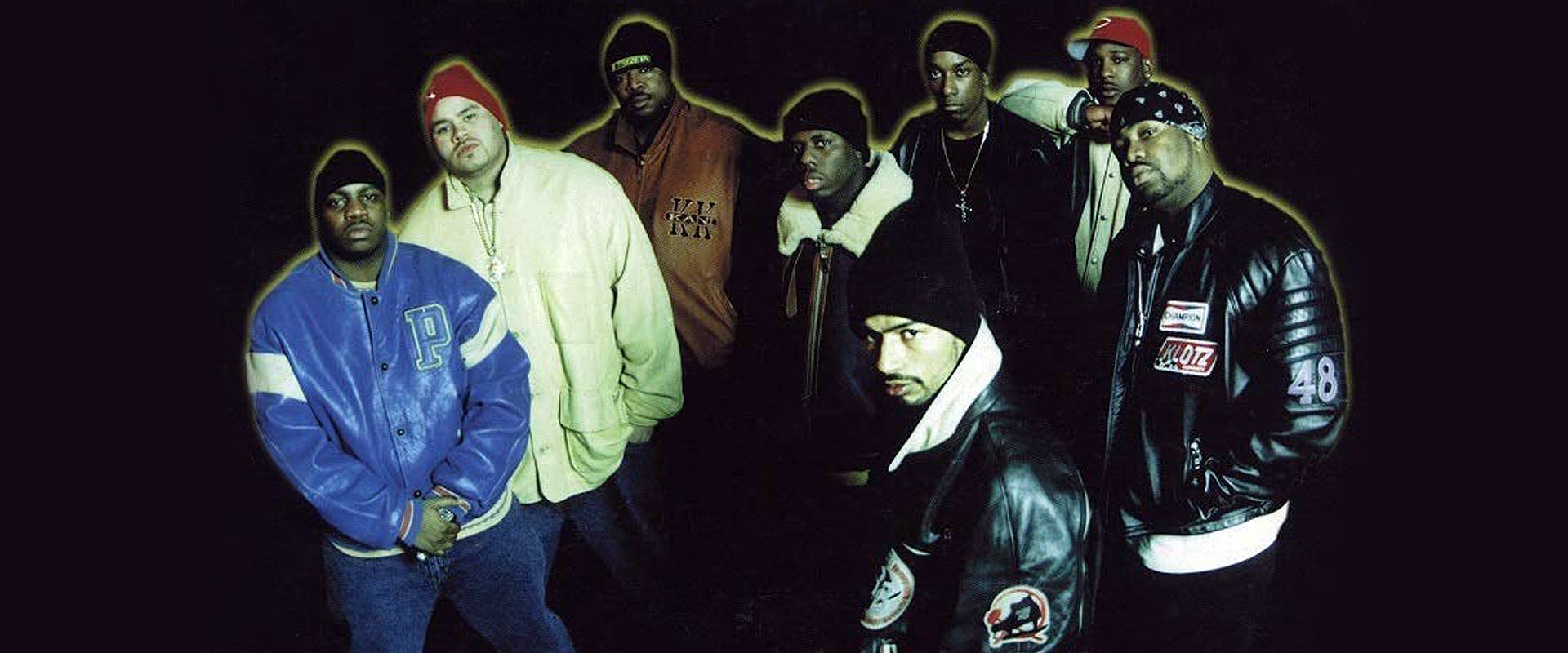
"Immersed" is the correct term. Joe's childhood bedroom was cluttered with flyers, the same flyers that fill Instagram on Hip-Hop's birthday and are auctioned off at Southeby's (along with Biggie's crown). The flyers were courtesy of Joe's older brother Dan, who was Joe's initial inspiration in becoming an emcee. Dan was also an early Hip-Hop Promoter and used to carry crates for Grandmaster Flash. Joe's older brother never made any money carrying those crates, but he was compensated well. "He never got paid in monetary currency, they would pay him by giving him boxes of flyers to the next jam they were throwing", Joe recalls. "His fee was to give that out just to be down with Grandmaster Flash."
Joe made Trinity Ave., one of the streets that enclosed Forest Houses, a household name on arguably his biggest hit, "Lean Back" and peppers his deep album cuts and other smashes with odes, tales, and hyper-specific shoutouts to his beloved borough. He staffs his squad with childhood friends, and even featured his longtime barber, Julio Fuente, in his video for "Don Cartagena". He still gets the chills just thinking about the place where he grew up and spent hours listening to Cold Crush Brothers and Fantastic Five tapes with Diamond D and co., or tagging "Crack TS", as part of the infamous TATS Cru.
"I just caught goosebumps all over my body right now," he tells me, sitting in front of the same display regularly seen on his Instagram live. Same smirk, same TS chain. "You could be from Brooklyn, you could be from Canarsie, you could be from Fort Greene, Bushwick, East New York... I'm from the Hood of Hip-Hop. The Mecca. I would watch Melle Mel and them play pick-up basketball games. I would watch Ruby Dee, the first Latino rapper ever, play softball games."
When Lord Finesse started getting played by DJ Red Alert, Joe saw a path for himself as a professional emcee. He ran through the Apollo competition and started putting himself in positions to be noticed. Still, he was rejected by five different labels before Chris Lighty helped him get a deal with Relativity Records. Diamond D recounts that experience as a slight, not just to Joe, but to the crew as well. "I kept going because I believed in him. He had won 'Live At the Apollo' three times. And as my artist, I had invested time and produced the tracks. So, him being rejected felt like we were getting rejected."
Joe's first two LP's, 1993's Represent and 1995's Jealous One's Envy, both carry an undeniable New York-rap-shit-tear-your-head-off vibe. You can hear the chip on Joe's shoulder embedded in every bar. "The gift and the curse is: I wanted to prove to everyone that I was the realest," Joe says. "And by doing that, there are certain limitations you put on yourself. Musically, you box yourself in. So, at the time I just wanted to show everybody that I was doing what I was rapping about and I deserve to be amongst the elite. The class of 92-93. Pretty much I was around the four corners of my block, my first album, my second album, it was a real New York, Bronx thing."
Joe accomplished this feat and won respect with his peers. "We're definitely from the same school of hard knocks, same classroom," Raekwon told me with a worn chuckle. "Not only is his personality genuine, but his legacy is bulletproof."
Listening to Joe's early albums in the context and order of his later and most famous works—and I actually did this while building an IKEA dresser—it's almost hard to believe that the same guy who made songs like "Shit Is Real" and "Success," records like "Dedication" and "Bronx Tale;" is also behind "What's Luv" and "We Thuggin'," "Make It Rain" or "All The Way Up."
Looking back on it, Joe is surprised as well, admitting that "Flow Joe"/Fat Joe The Gangsta couldn't imagine making something like "We Takin' Over" or "Feelin' So Good" with Jennifer Lopez.
"No way in the world, no way in the world," he says.
But by the time Joe got to his third album, Don Cartagena, he saw that Hip-Hop’s audience was expanding, as well as the other regions contributing to the sound, style, and culture. Joe wanted to expand as well. He also wanted to find a way towards financial security, and out of the projects. He was hanging out with LL COOL J when a lightbulb went off.
“I went to hang out with him in his house in Long Island,” Joe recalls. It was a mansion, and I was still in the hood even though I had 'Flow Joe' I was like, 'oh my god, this is incredible, how did you get this?" And the man told me, ‘Easy, we do the same thing. You just rap for the streets and underground, and I rap for the ladies and the commercial, and that's how I get money like that.’ And that's what sparked the lightbulb in my head.”
Joe also credits conversations with the producer L.E.S. Joe, hanging out with Biggie, and meeting Big Pun as the catalysts for pushing him to try new things - even if it felt uncomfortable or in contrast to his D.I.T.C. roots.
"I had been there through Puffy blowing up Biggie," Joe says about this progression. "Biggie was my man. I saw everything he did with Biggie. Biggie would've been an underground rapper if it wasn't for Puffy's history in R&B. Puffy taught him how to flip 'Juicy' and 'One More Chance.' I saw that with him."
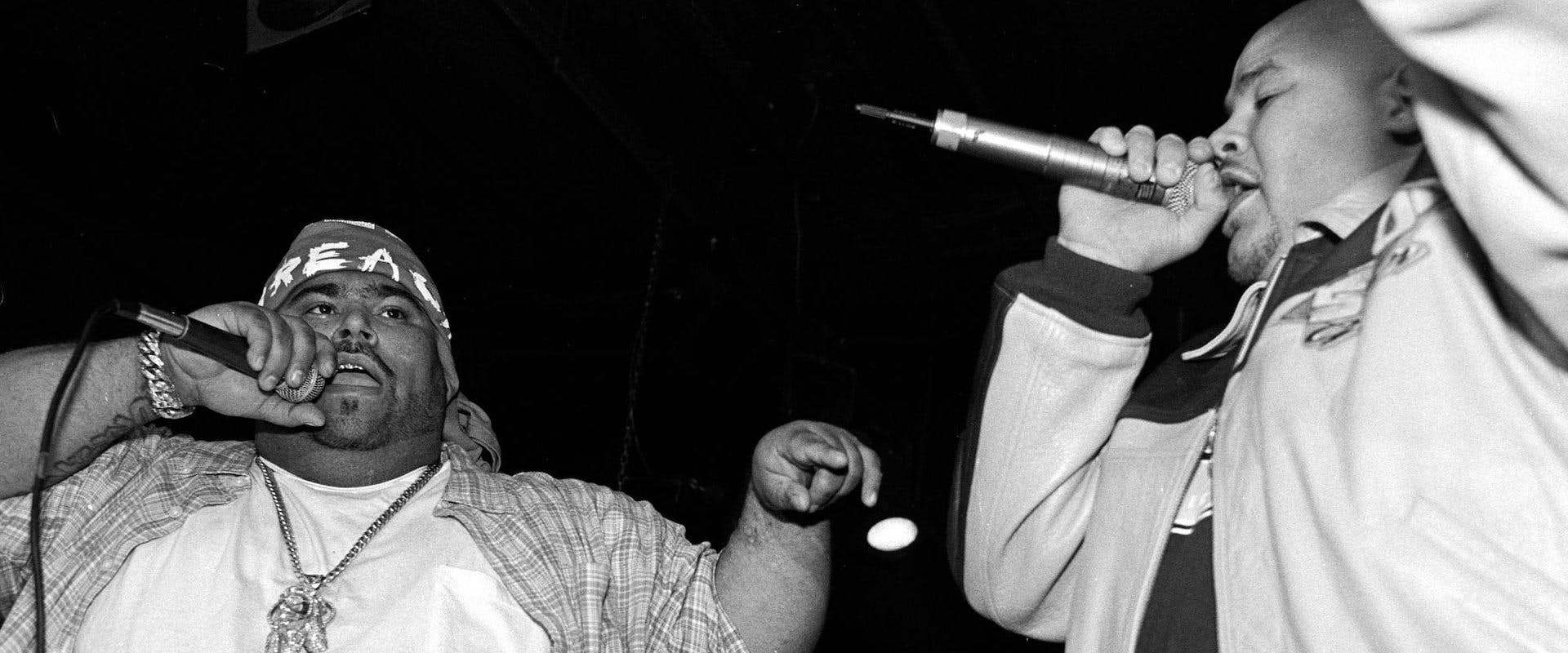
Joe took these observations and applied them to his work with his own protégé, Big Pun. He convinced Pun to make more mainstream songs, and in exchange, improved his own emcee toolbox. "When I discovered Big Pun, I knew he was a lyrical beast, I didn't want him to just be an underground guy. So, I convinced him to make records like that and in exchange, I was almost in Big Pun's school, where he taught me to make those songs. We'd be like, 'right here we're gonna talk about a girl... right here we're gonna talk about what car we're in. We're gonna talk about guys getting high... he taught me how to make this music. I never would've thought I'd make music like that. I was so underground. I come from Diggin' In The Crates. I come from Diamond D, Showbiz, Big L, OC, Buckwild; it's two different worlds."
Joe says he would've been happy to remain underground and let Big Pun have the spotlight, but then Pun unexpectedly died of a heart attack on February 7th, 2000. "I would've never been Fat Joe like 'Lean Back', 'All The Way Up,' 'What's Luv.' I would've remained underground cause Pun was meant to be a star. Pun died, that's why I took over. Pun was the franchise. Pun was the Greek Freak, the Kobe Bryant," he says. "I would've stood on the DITC, 'Don Cartagena' type underground hits. It wasn't 'til he died and we had tasted—we had grown a palette for money and expensive shit that made me say, 'Holy shit, now I gotta do songs like 'We Thuggin,' 'What's Luv.'"
DJ EFN, a Miami-based DJ and co-host of Drink Champs with N.O.R.E., has known Joe since the 90s; when Joe started to venture down to a pre-gentrified Wynwood District and connect with Miami's Zulu Nation faction and other early figures like DJ Raw. EFN has seen Joe's impact and influence grow over the years, and when it was time to create pilot episodes of Drink Champs to show proof of concept to CBS Radio, it was an easy decision to turn to Joey Crack, one of Hip-Hop's best storytellers. It's something that Joe talked about during that debut episode that has stuck with EFN ever since.
"He talked a lot about how he's just a student of the game and it's evident in everything that Joe does," EFN tells me over Zoom. "This is what I love about Joe - he's a student of the industry and that's what a lot of people don't get - and he's also a student of the culture. Which are two different things. There's a happy medium for Joe with both, but he's a businessman and he studies the music industry, its trends. And I could tell people, just look at what Joe did in terms of a lot of New York artists coming in and working with southern artists as the southern tide moved and took over everything. He was at the forefront of that. And he had been coming to Miami and working with people since the 90's... That's just a part of his business mind, but also him being a student of the culture. He loves Hip-Hop so much, but he also loves the grind, the industry grind and when he marries those two things, there's no stopping him."
It’s easy to overlook Joe’s deep deep roots when they are overshadowed by his big pop hits. It is also normal and expected for artists to forever leave the underground once they reach such a musical mountain top. The rarity of Fat Joe is that he went from the down-by-law authenticity of DITC to a household hit-maker and still shows up without question to the DITC reunion album, or has a true fan moment interviewing Big Daddy Kane on Instagram. Where some artists lose their underground respect as they climb the charts, or experience anxiety in growing an audience, Joe has experienced neither.
"I'm the realest, I'm the most authentic. The thing about me is, no matter how big I got, I could've made a record like 'What's Luv' or 'Lean Back,' number one in the country, I would show up to the Pharoahe Monch album release party and start doing songs like 'My Lifestyle' and 'I Shot Ya,' and 'Flow Joe,' heads would go crazy because even though we was platinum and double-platinum, this motherfucker will come to the biggest hole in the wall Bowery street and do nothing but underground songs, won't touch 'Lean Back,' just underground songs and motherfuckers is going crazy in there, my DITC shit, they're like, 'we can't front on Joe.'"
"These [different records] are just examples of who he is," says Bun B, who has known Joe for over 15 years, and also gave me the idea for this article during our own conversation last October in Chicago. "In both instances he's remaining true to who he is. He was always that dude that was getting money in the street. He's not making up any of that. He was always that dude that was about spitting raw bars. He's not making that up."
Bun B was in New York on April 17, 2019 to record the LP, Trill Statik, with Brooklyn-based producer/DJ, Statik Selektah. The duo endeavored to record the whole LP in 12 hours, which they did. The LP creation happened in real-time, streaming live on TIDAL. Fat Joe caught the livestream before falling asleep. Seeing the album get made on the spot, Joe got out of bed, got dressed, and hit the studio around 3 a.m. to put a verse and hook on "Basquiat."
Statik Selektah was in the room, and said the whole mood changed when Joe walked in. "When he showed up, the energy just got so much better," Statik told me via Zoom. "The way he sat in here and wrote his verse, he's just so Hip Hop bro. There's a very few people in the world like Fat Joe. And, here's another thing that people don't know, he called me about 20 times the next day. Over the next week, he just kept calling me, 'what are people saying? That was the funnest time I've had in years.' Joe loves Hip-Hop so much."
Just like Forrest Gump was guided by a deep-felt dedication to people such as Bubba, Jenny, and Lieutenant Dan, Joe feels a dedication to Hip-Hop. Hip-Hop got him out of bed that night as if he was Bruce Wayne seeing the weighted glow of the Bat-Signal.
"That night was all about the art form and culture. Not a dollar. It was like 'report to duty for Hip-Hop. Show up. Where the fuck is Sergeant Cartagena at?! Report for duty.' So, when I walked in there, I walked in there humble as shit like 'Can I get on this?' And the underground was looking at me like, 'My man just pulled up in a $500,000 car talking about, 'when can he report for duty?!' And their eyes are looking at me like 'oh shit, Crack is in here!'..."
"...And I'm looking at them like: 'I gotta do it.'"
